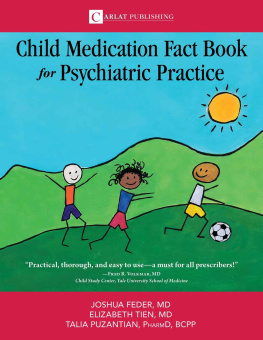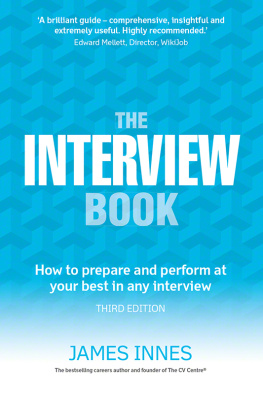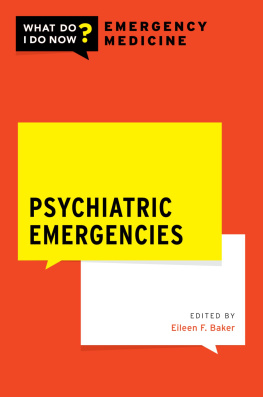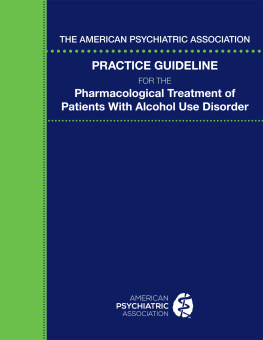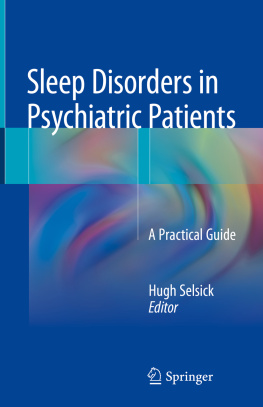Carlat - The psychiatric interview
Here you can read online Carlat - The psychiatric interview full text of the book (entire story) in english for free. Download pdf and epub, get meaning, cover and reviews about this ebook. year: 2017, publisher: Wolters Kluwer, genre: Home and family. Description of the work, (preface) as well as reviews are available. Best literature library LitArk.com created for fans of good reading and offers a wide selection of genres:
Romance novel
Science fiction
Adventure
Detective
Science
History
Home and family
Prose
Art
Politics
Computer
Non-fiction
Religion
Business
Children
Humor
Choose a favorite category and find really read worthwhile books. Enjoy immersion in the world of imagination, feel the emotions of the characters or learn something new for yourself, make an fascinating discovery.

- Book:The psychiatric interview
- Author:
- Publisher:Wolters Kluwer
- Genre:
- Year:2017
- Rating:4 / 5
- Favourites:Add to favourites
- Your mark:
- 80
- 1
- 2
- 3
- 4
- 5
The psychiatric interview: summary, description and annotation
We offer to read an annotation, description, summary or preface (depends on what the author of the book "The psychiatric interview" wrote himself). If you haven't found the necessary information about the book — write in the comments, we will try to find it.
Carlat: author's other books
Who wrote The psychiatric interview? Find out the surname, the name of the author of the book and a list of all author's works by series.
The psychiatric interview — read online for free the complete book (whole text) full work
Below is the text of the book, divided by pages. System saving the place of the last page read, allows you to conveniently read the book "The psychiatric interview" online for free, without having to search again every time where you left off. Put a bookmark, and you can go to the page where you finished reading at any time.
Font size:
Interval:
Bookmark:

INTERVIEW
INTERVIEW
Daniel J. Carlat, M.D.
Publisher
The Carlat Psychiatry Report
The Carlat Child Psychiatry Report
The Carlat Addiction Treatment Report
Associate Clinical Professor of Psychiatry
Tufts University School of Medicine
Boston, Massachusetts
Practical Guides in Psychiatry
Daniel J. Carlat, M.D.
Founding Editor

Acquisitions Editor: Jamie Elfrank
Product Development Editor: Andrea Vosburgh
Production Project Manager: Kim Cox
Design Coordinator: Stephen Druding
Manufacturing Coordinator: Beth Welsh
Marketing Manager: Rachel Mante Leung
Prepress Vendor: SPi Global
4th edition
Copyright 2017 Wolters Kluwer
Copyright 2012 Lippincott Williams & Wilkins, a Wolters Kluwer business. Copyright 2005, 1999 by Lippincott Williams & Wilkins. All rights reserved. This book is protected by copyright. No part of this book may be reproduced or transmitted in any form or by any means, including as photocopies or scanned-in or other electronic copies, or utilized by any information storage and retrieval system without written permission from the copyright owner, except for brief quotations embodied in critical articles and reviews. Materials appearing in this book prepared by individuals as part of their official duties as U.S. government employees are not covered by the above-mentioned copyright. To request permission, please contact Wolters Kluwer at Two Commerce Square, 2001 Market Street, Philadelphia, PA 19103, via email at (products and services).
9 8 7 6 5 4 3 2 1
Printed in China (or the United States of America)
Library of Congress Cataloging-in-Publication Data
Names: Carlat, Daniel J., author.
Title: The psychiatric interview / Daniel J. Carlat.
Other titles: Practical guides in psychiatry.
Description: Fourth edition. | Philadelphia : Wolters Kluwer, [2017] | Series: Practical guides in psychiatry | Includes bibliographical references and index.
Identifiers: LCCN 2016008384 | ISBN 9781496327710
Subjects: | MESH: Interview, Psychologicalmethods | Mental Disordersdiagnosis | Physician-Patient Relations | Handbooks
Classification: LCC RC480.7 | NLM WM 34 | DDC 616.89/075dc23 LC record available at http://lccn.loc.gov/2016008384
This work is provided as is, and the publisher disclaims any and all warranties, express or implied, including any warranties as to accuracy, comprehensiveness, or currency of the content of this work.
This work is no substitute for individual patient assessment based upon healthcare professionals examination of each patient and consideration of, among other things, age, weight, gender, current or prior medical conditions, medication history, laboratory data and other factors unique to the patient. The publisher does not provide medical advice or guidance and this work is merely a reference tool. Healthcare professionals, and not the publisher, are solely responsible for the use of this work including all medical judgments and for any resulting diagnosis and treatments.
Given continuous, rapid advances in medical science and health information, independent professional verification of medical diagnoses, indications, appropriate pharmaceutical selections and dosages, and treatment options should be made and healthcare professionals should consult a variety of sources. When prescribing medication, healthcare professionals are advised to consult the product information sheet (the manufacturers package insert) accompanying each drug to verify, among other things, conditions of use, warnings and side effects and identify any changes in dosage schedule or contraindications, particularly if the medication to be administered is new, infrequently used or has a narrow therapeutic range. To the maximum extent permitted under applicable law, no responsibility is assumed by the publisher for any injury and/or damage to persons or property, as a matter of products liability, negligence law or otherwise, or from any reference to or use by any person of this work.
LWW.com
To my patients, past, present, and future.
Thank you for allowing me to ask you question after question, and
thank you for answering so honestly.
The Psychiatric Interview is straightforward, practical, and wise, yet often lighthearted and funny, a breath of fresh air where comparable references have often been boring and ponderous. It brims with extraordinary gifts for its readers. It is a scholarly review of the research literature, yet it moves swiftly and has a light, even jaunty, tone. It is very much up-to-date and serves as a useful introduction to many ideas, such as those from psychodynamics, that are not widely available to contemporary students.
Best of all, the book is alive, an extraordinary achievement in view of the amount of detailed material presented. It emphasizes the person within the patient and the need to form an alliance with that person to secure reliable information and cooperation in treatment. We feel the patients presented by Dr. Carlat; they are not simply diagnoses. Dr. Carlat offsets the professions reputation for being cheerless and pathology minded; he illustrates many ways by which effective relationships can be formed and shows how relationships that are endangered can be repaired, perhaps especially at the close of an interview.
The Psychiatric Interview is designed in an easily accessible format, with aids for memory, appendices for organizing information, and sensible guides for recordkeeping. This is teaching by example at its best, with the examples both vivid and pointed, so that they stick in the readers mind.
Truly understanding another human being is a daunting challenge, yet nothing is more important if we are to soothe the suffering of a ravaged soul. Use this book as a guide to reach for that understanding.
Leston Havens, M.D.
Professor of Psychiatry, Emeritus
Harvard Medical School
The Cambridge Health Alliance
Cambridge, Massachusetts
Over the course of a 40-year professional career, you will do ~100,000 diagnostic interviews. The diagnostic interview is by far the most important tool in the arsenal of any clinician, and yet the average training program directs relatively few resources to specific training in the skills required for it. The general assumption seems to be that if you do enough interviews with different kinds of patients, youll naturally pick up the required skills. That may be true, but it can take a long time, and the learning process can be painful.
I hatched the idea for this manual one night during my first year of psychiatric residency. Starting my shift in the acute psychiatry service (APS), I noticed five patients in the waiting room; the resident who handed me the emergency room beeper said that there were two more patients in the emergency room, both in restraints. At that moment, the beeper sounded, and I called the number. Psychiatry? This is Ellison 6. We have a patient up here who says hes depressed and suicidal. Please come and evaluate, stat. That meant that I had a total of eight diagnostic assessments to do.
As the night stretched on, my interviews got briefer. The developmental history was the first to go, followed quickly by the formal mental status examination. This trimming process continued until, at 5 a.m., it reached its absurd, but inevitable, conclusion. My entire interview consisted of little more than the following question: Are you suicidal?
Font size:
Interval:
Bookmark:
Similar books «The psychiatric interview»
Look at similar books to The psychiatric interview. We have selected literature similar in name and meaning in the hope of providing readers with more options to find new, interesting, not yet read works.
Discussion, reviews of the book The psychiatric interview and just readers' own opinions. Leave your comments, write what you think about the work, its meaning or the main characters. Specify what exactly you liked and what you didn't like, and why you think so.


